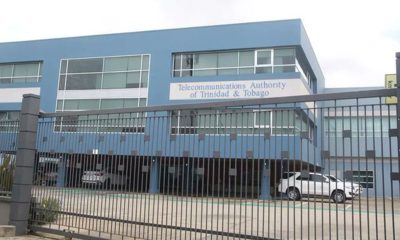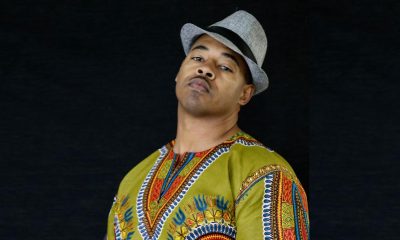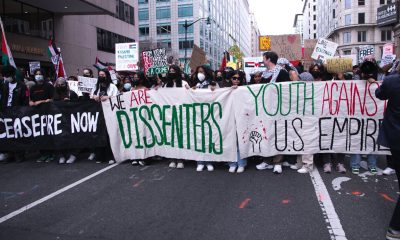Business
Providing Match Makers Throughout the Black Diaspora – Way Cool!
NNPA NEWSWIRE — One of the biggest thrills is the fact that we Afro Americans in the United States have so much in common with the Afro Americans of South and Central America. Our roots are Western Africa. Our passages to the new world are similar via the utmost horrific human bondage, rape, and atrocities history has recorded. Some of our DNA may be directly related for all that we know. But the separation by centuries cannot keep us apart here in the 21st century.
By Harry C. Alford & Kay DeBow
During the mid-1990’s we began sponsoring exploratory or fact-finding trips to nations in the Caribbean and West Africa. Then we expanded to East Africa and South America, i.e.: Brazil. After getting comfortable and understanding the “Export/Import” challenges, we dared to start doing formal Trade Missions.
During Thanksgiving week in the year 2000, we took 84 Black-owned businesses to Rio de Janeiro for an aggressive Match Making event. In the end, we documented over $30 million in sales from the activities that began during that week. The equivalent to the Rio de Janeiro Chamber of Commerce gave us a certificate for promoting the most successful Trade Mission to ever visit the city.
The above experience was typical of our ambition. We didn’t really know if we were doing things correctly. However, we had the courage to explore and succeed — whatever it took, we did it.
We miss those days and have decided to return to that big “Bravado.” Win or lose, we will proceed with a vengeance. As they say, “Shoot for the moon. You may miss and fall among the stars.”
We have completed many successful Match Makers. It’s a can’t lose proposition. You go to explore and make business allies. The new relationships are a beginning and they develop like new crops sprouting up in the springtime. Nothing ventured, nothing gained. Explore, educate and grow. Those are the options!
We go to Cali, Columbia next month for a much-anticipated Match Making/Fact Finding event to last almost a week in time. The Cali region of Columbia is along the Pacific Coast. One of the towns we will visit is named San Buena Ventura. Coincidentally, Harry’s birthplace is Ventura, California (formerly San Buena Ventura when settled by Spanish Explorers).
One of the biggest thrills is the fact that we Afro Americans in the United States have so much in common with the Afro Americans of South and Central America. Our roots are Western Africa. Our passages to the new world are similar via the utmost horrific human bondage, rape, and atrocities history has recorded. Some of our DNA may be directly related for all that we know. But the separation by centuries cannot keep us apart here in the 21st century.
That’s what Afro Americans have in common regardless of current geographies. What does not kill us makes us stronger. This is a testament to our upcoming trade successes.
We must be the envy of the rest of the world. We do not die. We multiply.
Native Americans and Europeans must look at us and marvel. No one runs faster. No one jumps higher. No one is stronger. All that and beautiful too. We have SOUL! And STYLE!
You could say that we are strangers from other parts of the world, meeting for the first time. However, it can also be considered a family reunion of long lost cousins separated at youth and now joined together through common struggles and compulsory toils.
We are trailblazers and we must never forget that as we interact during our journeys. Our nations are depending on us to represent and make economic progress that will be mutual to both sides of the business table.
Afro Americans in the United States account for over 47 million people. How many in Central and South America? That gets tricky. The governments of most nations in Latin America will only count those with 100% African blood as Black. The rest are “mixed.”
That is deceitful as “one drop will do you” by the general standard and social status. The reality is that over 150 million people from Mexico to Argentina have significant Black African blood flowing through their veins. They are our relatives people!
The more we visit and interact with our “cousins,” the better it will be for our daily lives and prospects for our future. To date, we have had historical trips to Costa Rica, Brazil, Columbia, Surinam and all over the Caribbean with future trips lining up for the rest of the Western Hemisphere.
Get on board! The opportunities to connect with your blood relatives are numerous in numbers. Don’t sit idly by. For information on the upcoming Columbia Trade Mission go here: https://bit.ly/2V0JLnc
Mr. Alford is the Co-Founder, President/CEO of the National Black Chamber of Commerce ®. Ms. DeBow is the Co-Founder, Executive Vice President of the Chamber. Website: www.nationalbcc.org Emails: halford@nationalbcc.org kdebow@nationalbcc.org
Bay Area
State Controller Malia Cohen Keynote Speaker at S.F. Wealth Conference
California State Controller Malia Cohen delivered the keynote speech to over 50 business women at the Black Wealth Brunch held on March 28 at the War Memorial and Performing Arts Center at 301 Van Ness Ave. in San Francisco. The Enterprising Women Networking SF Chapter of the American Business Women’s Association (ABWA) hosted the Green Room event to launch its platform designed to close the racial wealth gap in Black and Brown communities.

By Carla Thomas
California State Controller Malia Cohen delivered the keynote speech to over 50 business women at the Black Wealth Brunch held on March 28 at the War Memorial and Performing Arts Center at 301 Van Ness Ave. in San Francisco.
The Enterprising Women Networking SF Chapter of the American Business Women’s Association (ABWA) hosted the Green Room event to launch its platform designed to close the racial wealth gap in Black and Brown communities.
“Our goal is to educate Black and Brown families in the masses about financial wellness, wealth building, and how to protect and preserve wealth,” said ABWA San Francisco Chapter President LaRonda Smith.
ABWA’s mission is to bring together businesswomen of diverse occupations and provide opportunities for them to help themselves and others grow personally and professionally through leadership, education, networking support, and national recognition.
“This day is about recognizing influential women, hearing from an accomplished woman as our keynote speaker and allowing women to come together as powerful people,” said ABWA SF Chapter Vice President Velma Landers.
More than 60 attendees dined on the culinary delights of Chef Sharon Lee of The Spot catering, which included a full soul food brunch of skewered shrimp, chicken, blackened salmon, and mac and cheese.
Cohen discussed the many economic disparities women and people of color face. From pay equity to financial literacy, Cohen shared not only statistics, but was excited about a new solution in motion which entailed partnering with Californians for Financial Education.
“I want everyone to reach their full potential,” she said. “Just a few weeks ago in Sacramento, I partnered with an organization, Californians for Financial Education.
“We gathered 990 signatures and submitted it to the [California] Secretary of State to get an initiative on the ballot that guarantees personal finance courses for every public school kid in the state of California.
“Every California student deserves an equal opportunity to learn about filing taxes, interest rates, budgets, and understanding the impact of credit scores. The way we begin to do that is to teach it,” Cohen said.
By equipping students with information, Cohen hopes to close the financial wealth gap, and give everyone an opportunity to reach their full financial potential. “They have to first be equipped with the information and education is the key. Then all we need are opportunities to step into spaces and places of power.”
Cohen went on to share that in her own upbringing, she was not guided on financial principles that could jump start her finances. “Communities of color don’t have the same information and I don’t know about you, but I did not grow up listening to my parents discussing their assets, their investments, and diversifying their portfolio. This is the kind of nomenclature and language we are trying to introduce to our future generations so we can pivot from a life of poverty so we can pivot away and never return to poverty.”
Cohen urged audience members to pass the initiative on the November 2024 ballot.
“When we come together as women, uplift women, and support women, we all win. By networking and learning together, we can continue to build generational wealth,” said Landers. “Passing a powerful initiative will ensure the next generation of California students will be empowered to make more informed financial decisions, decisions that will last them a lifetime.”
Business
Black Business Summit Focuses on Equity, Access and Data
The California African American Chamber of Commerce hosted its second annual “State of the California African American Economy Summit,” with the aim of bolstering Black economic influence through education and fellowship. Held Jan. 24 to Jan. 25 at the Westin Los Angeles Airport Hotel, the convention brought together some of the most influential Black business leaders, policy makers and economic thinkers in the state. The discussions focused on a wide range of economic topics pertinent to California’s African American business community, including policy, government contracts, and equity, and more.

By Solomon O. Smith, California Black Media
The California African American Chamber of Commerce hosted its second annual “State of the California African American Economy Summit,” with the aim of bolstering Black economic influence through education and fellowship.
Held Jan. 24 to Jan. 25 at the Westin Los Angeles Airport Hotel, the convention brought together some of the most influential Black business leaders, policy makers and economic thinkers in the state. The discussions focused on a wide range of economic topics pertinent to California’s African American business community, including policy, government contracts, and equity, and more.
Toks Omishakin, Secretary of the California State Transportation Agency (CALSTA) was a guest at the event. He told attendees about his department’s efforts to increase access for Black business owners.
“One thing I’m taking away from this for sure is we’re going to have to do a better job of connecting through your chambers of all these opportunities of billions of dollars that are coming down the pike. I’m honestly disappointed that people don’t know, so we’ll do better,” said Omishakin.
Lueathel Seawood, the president of the African American Chamber of Commerce of San Joaquin County, expressed frustration with obtaining federal contracts for small businesses, and completing the process. She observed that once a small business was certified as DBE, a Disadvantaged Business Enterprises, there was little help getting to the next step.
Omishakin admitted there is more work to be done to help them complete the process and include them in upcoming projects. However, the high-speed rail system expansion by the California High-Speed Rail Authority has set a goal of 30% participation from small businesses — only 10 percent is set aside for DBE.
The importance of Diversity, Equity and Inclusion (DEI) in economics was reinforced during the “State of the California Economy” talk led by author and economist Julianne Malveaux, and Anthony Asadullah Samad, Executive Director of the Mervyn Dymally African American Political and Economic Institute (MDAAPEI) at California State University, Dominguez Hills.
Assaults on DEI disproportionately affect women of color and Black women, according to Malveaux. When asked what role the loss of DEI might serve in economics, she suggested a more sinister purpose.
“The genesis of all this is anti-blackness. So, your question about how this fits into the economy is economic exclusion, that essentially has been promoted as public policy,” said Malveaux.
The most anticipated speaker at the event was Janice Bryant Howroyd known affectionately to her peers as “JBH.” She is one of the first Black women to run and own a multi-billion-dollar company. Her company ActOne Group, is one of the largest, and most recognized, hiring, staffing and human resources firms in the world. She is the author of “Acting Up” and has a profile on Forbes.
Chairman of the board of directors of the California African American Chamber of Commerce, Timothy Alan Simon, a lawyer and the first Black Appointments Secretary in the Office of the Governor of California, moderated. They discussed the state of Black entrepreneurship in the country and Howroyd gave advice to other business owners.
“We look to inspire and educate,” said Howroyd. “Inspiration is great but when I’ve got people’s attention, I want to teach them something.”
Activism
Oakland Post: Week of April 17 – 23, 2024
The printed Weekly Edition of the Oakland Post: Week of April 17 – 23, 2024

To enlarge your view of this issue, use the slider, magnifying glass icon or full page icon in the lower right corner of the browser window. ![]()
-

 Activism4 weeks ago
Activism4 weeks agoOakland Post: Week of March 27 – April 2, 2024
-

 #NNPA BlackPress4 weeks ago
#NNPA BlackPress4 weeks agoCOMMENTARY: D.C. Crime Bill Fails to Address Root Causes of Violence and Incarceration
-

 #NNPA BlackPress4 weeks ago
#NNPA BlackPress4 weeks agoFrom Raids to Revelations: The Dark Turn in Sean ‘Diddy’ Combs’ Saga
-

 #NNPA BlackPress4 weeks ago
#NNPA BlackPress4 weeks agoCOMMENTARY: Lady Day and The Lights!
-

 #NNPA BlackPress4 weeks ago
#NNPA BlackPress4 weeks agoMayor, City Council President React to May 31 Closing of Birmingham-Southern College
-

 #NNPA BlackPress4 weeks ago
#NNPA BlackPress4 weeks agoBaltimore Key Bridge Catastrophe: A City’s Heartbreak and a Nation’s Alarm
-

 #NNPA BlackPress4 weeks ago
#NNPA BlackPress4 weeks agoBaltimore’s Key Bridge Struck by Ship, Collapses into Water
-

 #NNPA BlackPress4 weeks ago
#NNPA BlackPress4 weeks agoBeloved Actor and Activist Louis Cameron Gossett Jr. Dies at 87



















































